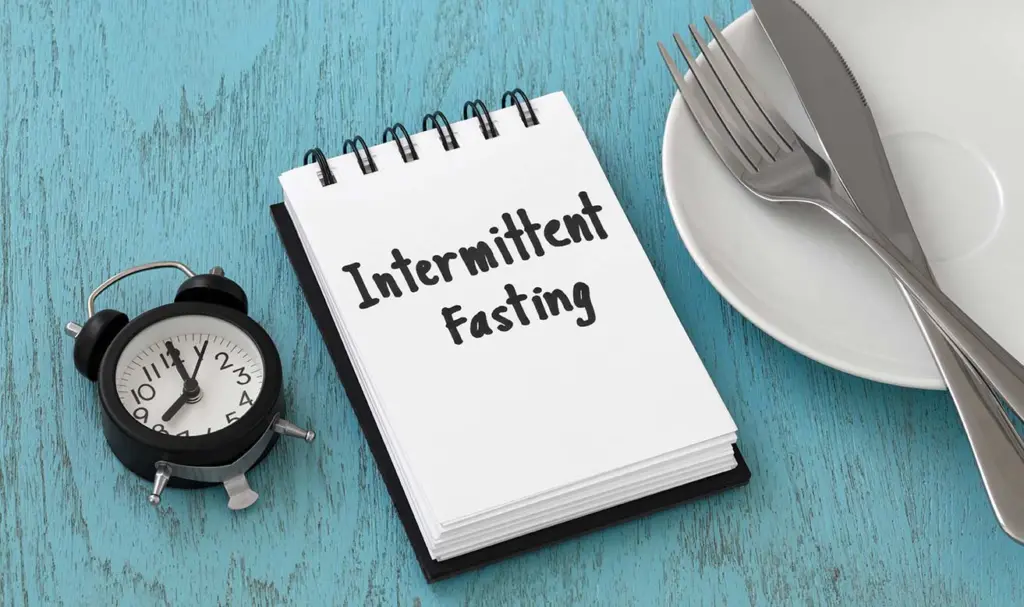By Jen ScheinmanJen Scheinman, MS, RDN is an integrative and functionally trained Registered Dietitian, with over 20 years of helping people improve their health through the foods they eat. Using real food and lifestyle design she helps her clients navigate their way towards optimal health.What if I told you the latest diet trend wasn’t about what food you should eat? No meal plans or food restrictions. No sugar-free, low carb, keto, or paleo labels. No avoiding your favorite foods or eating foods you hate. You’d probably think this was a joke. But the latest weight loss plan everyone is talking about looks at eating a different way. Intermittent fasting (IF) is a style of eating that focuses on WHEN you eat as opposed to WHAT you eat.
Fasting is something the human body has evolved to do. Early man did not have continuous access to food as we do today and had to rely on body fat for energy in times of food shortages. As man began to evolve and food shortage became less of an issue, fasting remained part of human culture in religious observances, political and social statements (hunger strikes), and medical treatments dating as far back as Hippocrates. While fasting has been around for centuries, only recently has current science looked into the benefits of this ancient practice.
What is intermittent fasting?
IF is precisely what it sounds like. It is alternating periods of not eating (or eating very little) with periods where you eat your regular diet. While you limit food during times of fasting, you can drink non-caloric beverages such as water, tea, or black coffee. There are several methods of IF out there, but here are three of the most popular:
- 5:2 diet: this protocol allows you to eat as you typically would for five days of the week, and on two days of the week, you only consume 500-600 calories.
- Alternate day fasting: just as the name describes, with this fasting method, you rotate fasting and eating every other day. For the 24 hours of the fast day, you may eat 500 calories worth of food or beverages. On non-fast days you eat as you usually would, without calorie restriction.
- Time-restricted eating (TRE): this method involves a daily shortening of the window in which you eat. For example, many people have success when they fast for 16 hours a day and eat within an 8-hour window. This can easily be done by finishing dinner at 8 p.m. and not eating again until noon the next day.
What the science says:
There has been a lot of promising research around IF. Much of it is in animal models, but more and more human trials are now published regularly. The benefits of fasting include:
- Weight loss: The main reason people try IF is for weight loss, and research suggests that there is a benefit here. In addition to lowering the amount of calories you eat, IF may encourage weight loss by improving how your body uses the hormones insulin and leptin. Insulin tells the body to store energy in the form of fat, and leptin tells the body that you are full.
- Heart health: IF appears to improve cholesterol levels and decrease the risk of developing heart disease.
- Diabetes risk: In addition to improving insulin resistance and fasting insulin levels, IF also lowers blood glucose levels.
- Healthy aging: Studies show that IF may slow the aging process and increase lifespan.
- Improves brain function: IF increases brain derived neurotrophic factor (BDNF), which plays a role in memory and learning. IF may also protect against Alzheimer’s disease.
- Cancer: IF may protect against cancer and increase tolerance of chemotherapy, improving the quality of life for patients undergoing cancer treatment.
Should I try IF?
By now, you may be thinking that IF sounds like something you’d like to try, but it may be risky for some people. People with diabetes or prediabetes, heart disease, including low blood pressure or other chronic health issues, should consult with their healthcare provider before trying IF. It is not advised for women who are pregnant, nursing, trying to conceive, or have a history of menstrual irregularities to do IF.
IF is not for everyone, but it can be a powerful tool for many people. Just because you decide to incorporate IF into your life, this does not give you a free pass to eat junk food the rest of the time. While nutritious whole foods should still be the basis of your meals, IF may be just the thing to help you feel empowered, and not restricted by healthy eating.Jen Scheinman, MS, RDN is an integrative and functionally trained Registered Dietitian, with over 20 years of helping people improve their health through the foods they eat. Using real food and lifestyle design she helps her clients navigate their way towards optimal health.
